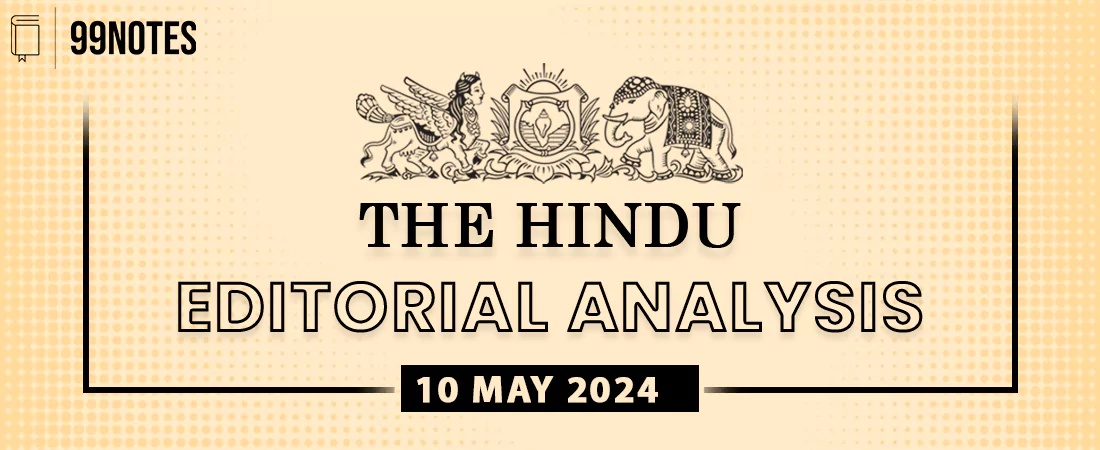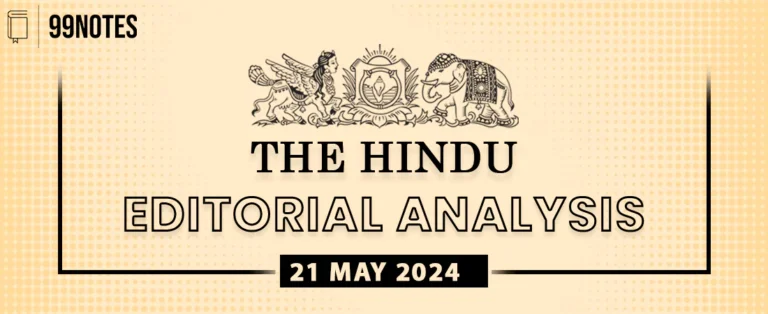10 May 2024 : The Hindu Editorial Notes PDF
1. An AI-infused world needs matching cybersecurity
| Topic: GS3 – Internal Security – Challenges to internal security through communication networks. |
| Context |
| ● The article encapsulates the growing concerns surrounding the misuse of generative AI, highlighted by incidents like hackers impersonating kidnappers.
● It discusses the multifaceted impact of generative AI on cybersecurity, productivity, and privacy, emphasising the need for international collaboration and comprehensive solutions. |
Introduction to the Impact of Generative AI
- The misuse of generative AI was highlighted in a disturbing incident involving hackers impersonating kidnappers, leading to concerns in the U.S. Senate.
- Despite its transformative potential across various sectors, generative AI has also introduced significant cyber-risks, challenging the perception of reality.
| What is Generative AI? |
| ● Generative AI refers to a subset of artificial intelligence technology that is designed to generate new content, such as images, text, or audio, that is indistinguishable from human-created content.
● It utilises techniques like deep learning and neural networks to analyse and understand patterns in data, allowing it to generate realistic and coherent outputs. ● Generative AI has diverse applications across industries, including image synthesis, natural language processing, and music composition. ● It has transformed various sectors, including healthcare, finance, and entertainment, by automating tasks, creating personalised experiences, and generating innovative solutions. ● However, the misuse of generative AI poses significant challenges to cybersecurity, privacy, and societal trust, necessitating robust regulations and ethical frameworks. |
Challenges and Risks of Generative AI
- The integration of generative AI into sectors like education, banking, and healthcare has revolutionised operations but also introduced new cyber threats.
- A dramatic increase in phishing incidents and credential phishing has been observed, driven by the exploitation of generative AI technology.
- Organisations and individuals face heightened susceptibility to cyberattacks, with 75% of professionals witnessing a surge in attacks, primarily attributed to generative AI.
Emerging Threats and Privacy Concerns
- Advanced cyber threats leveraging generative AI techniques include cognitive behavioural manipulation and privacy breaches through biometric identification systems.
- Voice-activated toys and gadgets pose risks by encouraging dangerous behaviours in children, while facial recognition systems threaten individual privacy rights.
Impact on Productivity and Vulnerabilities
- Despite boosting productivity for 70% of professionals, generative AI manipulation has increased vulnerabilities, including undetectable phishing attacks and growing privacy concerns.
- Complex hacker groups utilising generative AI models to enhance cyberattacks have been identified, highlighting the urgent need for robust cybersecurity initiatives.
International Collaborative Efforts
- World leaders have initiated collaborative efforts, as demonstrated by the signing of the Bletchley Declaration at the AI Safety Summit, aiming to understand and address the harmful effects of AI misuse.
- The declaration involves countries like China, the EU, India, and the US, emphasising the importance of institutional policy-led efforts to combat AI-related cyber threats.
| Bletchley Declaration: |
| ● The Bletchley Declaration emphasises the enormous global opportunities presented by Artificial Intelligence (AI) for enhancing human well-being, peace, and prosperity.
● It affirms the importance of designing, developing, deploying, and using AI in a safe, human-centric, trustworthy, and responsible manner. ● The declaration acknowledges the transformative potential of AI across various sectors such as housing, employment, education, healthcare, and justice, and underscores the need to address the risks associated with AI, including those related to human rights, transparency, fairness, accountability, and privacy. ● It calls for international cooperation to ensure the safety and responsible use of AI, particularly in addressing risks arising from frontier AI, which possesses highly capable and potentially harmful capabilities. ● The declaration highlights the role of nations, international fora, companies, civil society, and academia in collaborating to address AI safety concerns and promote inclusive AI development. ● India is also a party to the declaration |
Policy and Institutional Solutions
- Stern policy-led efforts are essential for bolstering cybersecurity, including the implementation of watermarking to identify AI-generated content and the development of practical regulatory frameworks.
- Collaboration between institutional and industrial stakeholders, incorporating public feedback, can strengthen regulations and mitigate AI-related risks effectively.
Corporate Awareness and Digital Literacy
- Corporations must prioritise digital awareness through media and literacy training sessions to enhance digital fluency and address gaps in digital knowledge among employees.
- Building a digitally savvy workforce is crucial for navigating the digital landscape, verifying sources, and identifying credible information.
Community Empowerment and Cyber Literacy
- Non-governmental and outreach organisations play a vital role in fostering cyber literacy and empowering individuals to navigate the digital world securely.
- By nurturing digitally literate communities, we can build a robust defence against evolving cyber threats in an AI-driven digital landscape.
Conclusion
- Collaborative efforts between governments, institutions, corporations, and communities are crucial for safeguarding against the detrimental impacts of generative AI misuse.
- Through policy initiatives, digital literacy programs, and community empowerment, we can strengthen cybersecurity and protect personal interests and identities in an AI-driven world.
| PYQ: Introduce the concept of Artificial Intelligence (AI). How does AI help clinical diagnosis? Do you perceive any threat to privacy of the individual in the use of Al in healthcare? (150 words/10m) (UPSC CSE (M) GS-3 2023) |
| Practice Question: How does the rise of generative AI pose challenges to cybersecurity and privacy? Discuss potential strategies for mitigating these risks in a global context. (250 Words /15 marks) |







